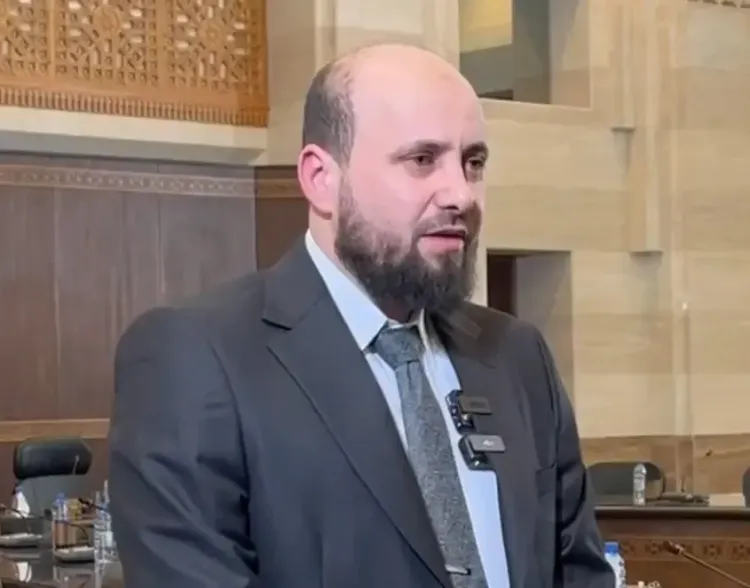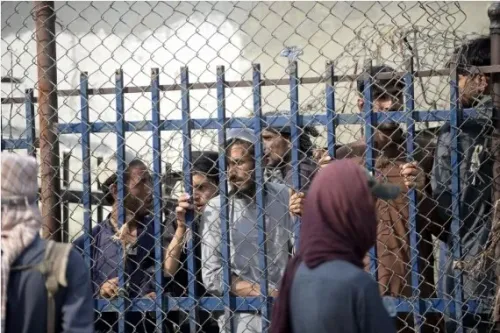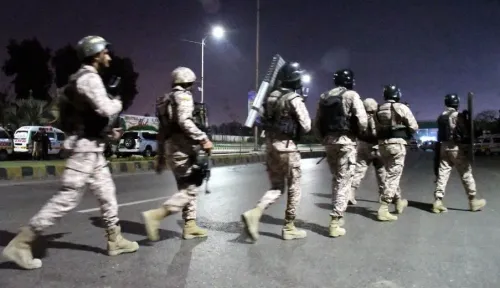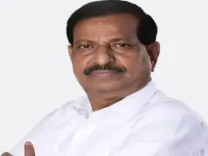Syria Establishes New Transitional Government Amidst Condemnation of Israeli Military Actions

Damascus, Dec 11 (NationPress) Syria is currently navigating a critical transition as the military forces that recently deposed President Bashar al-Assad have established a new transitional government.
This announcement followed a cabinet meeting in Damascus, where leaders from the military and former officials from the Assad regime convened to create a caretaker administration.
Mohammed al-Bashir, a relatively obscure figure who once led a minor region in Syria, has been appointed as the head of this transitional government, which is expected to guide Syria until March 2025.
The ministers of the transitional government convened with members of the ousted al-Assad regime to facilitate a smooth handover of state institutions. Prime Minister al-Bashir stressed the necessity of maintaining security, restoring essential services, and preventing state fragmentation during this interim period. He urged outgoing ministers to collaborate to ensure the continuity of public services, underscoring the significance of a seamless transition.
Born in 1983, al-Bashir was an electrical engineer and previously led the 'Syrian Salvation Government (SSG)' in Idlib, which was established in 2017 by the Hayat Tahrir al-Sham (HTS) and other militant groups during the Syrian civil war. The SSG held administrative and service-related authority in regions under HTS control in Syria.
The establishment of a transitional government may provide a glimmer of hope for peace, but the potential for enduring stability remains uncertain.
While certain areas of Syria, including Damascus, are witnessing signs of normalcy—such as the reopening of businesses and the resumption of public transportation—the overall situation remains precarious. The downfall of the al-Assad regime has created a power vacuum, rendering Syria susceptible to external influences.
Israel has intensified its military operations in Syria, executing airstrikes and ground missions aimed at critical military infrastructure. Israel's objective is to diminish Iranian influence and thwart the transfer of arms to hostile entities, particularly Iranian-backed militias, according to reports from the Xinhua news agency.
A correspondent from Xinhua reported observing Israeli armored personnel carriers in the demilitarized zone along the Syrian-Israeli border on Tuesday, in violation of the 1974 Disengagement Agreement.
Turkey has similarly targeted Syrian military assets, including a naval base, as part of its strategy to curtail Kurdish autonomy in Syria, perceiving Kurdish forces as a threat.
This foreign intervention complicates Syria's future, with various external powers pursuing their individual agendas.
Israel's military actions have faced widespread condemnation from regional stakeholders. Nations such as Iran, Egypt, Saudi Arabia, and the United Arab Emirates (UAE) have criticized the Israeli strikes, accusing Israel of breaching Syria's sovereignty and exacerbating regional tensions. Iran, in particular, denounced Israel's 'frequent aggression' and called for a United Nations (UN) response to hold Israel accountable.
The United Nations Special Envoy for Syria, Geir Pedersen, has urged an end to foreign military interventions, calling on the international community to back Syria's transition process and assist the nation in forging a path toward unity. Pedersen asserted that the Syrian populace must be allowed to determine their own future without outside interference.
Egypt and Saudi Arabia have also highlighted the necessity for a Syrian-led political process, free from external pressures.
The UAE condemned Israel's appropriation of the demilitarized buffer zone in the Golan Heights, deeming it a violation of international law and the 1974 Disengagement Agreement. The UAE rejected such actions, asserting that they heighten regional tensions and hinder peace initiatives.
Turkey, which has actively engaged in military operations in Syria, similarly condemned Israel's actions in the Golan Heights, underscoring the necessity for all foreign entities to respect Syria's territorial integrity.
In the West, US Secretary of State Antony Blinken reiterated Washington's support for a Syrian-led and -owned political transition that leads to credible, inclusive, and non-sectarian governance.
Likewise, European leaders, including German Chancellor Olaf Scholz and French President Emmanuel Macron, expressed their willingness to collaborate with Syria's new administration, provided that fundamental human rights and the protection of ethnic and religious minorities are upheld.
As Syria embarks on this uncertain journey, the influence of external powers continues to complicate efforts to attain lasting peace and stability. The military actions by Israel and Turkey, coupled with internal divisions, pose significant challenges for the newly formed transitional government.
In the upcoming months, the international community will closely observe the government's capability to navigate these complexities and whether it can foster a consensus for a peaceful, democratic future.
Syria's trajectory forward is laden with hurdles, and only time will reveal if the new government can fulfill the aspirations of the Syrian people.










